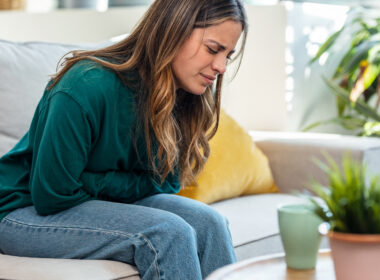On a good day, my battle with polycystic ovary syndrome (PCOS) is a burden I must carry, making me stronger, more intentional, and more merciful towards myself and others. Every other day, it’s an intense emotional battle–the bane of my existence, and an ugly reminder that I am chronically ill. Although the emotional effects of PCOS are a little-discussed aspect of this disorder, PCOS has the potential to cause severe psychological distress in the estimated 5 million American women affected by this chronic disease.
While each woman’s PCOS journey is different, I think the high emotional toll that accompanies this disorder is a common thread connecting every PCOS story. From unwanted body hair to ceaseless sugar cravings, extremely heavy periods and severe menstrual cramps, the many painful, sometimes embarrassing symptoms of PCOS can wreak havoc on a woman’s emotions, especially if the condition is left unchecked.
My emotional battle with PCOS began before I even knew that I had the disease
It all started when I was teenager, and first began to notice that my body looked a little different than other girls my age. I remember feeling left out as my classmates were maturing and their bodies were developing. It seemed that somewhere along the way, I had missed the train carrying hips and breasts. And despite being a highly active, three-season athlete throughout high school, I always seemed to carry weight around my abdomen. While I knew that genetics plays a role in body makeup and composition, I still began to wonder if something could be “off” long before I learned I had PCOS. These differences in my body and my PCOS symptoms made me feel broken, defective, and ultimately, unhealthy.
I’m now nearing 30 and I continue to fight the emotional battles of PCOS. I still struggle with the choices I must make just to feel “okay” while living with this condition, much less to thrive with it. In particular, there are three persistent emotional struggles I have dealt with over the course of my journey with PCOS. I see these struggles as the “lies” that PCOS tells me about myself. I want to share these with you today, and the positive strategies that help me fight the many emotional battles of PCOS.
PCOS Lie #1: You will never be “whole”
Chronic illness is just that, chronic. While I have faith that I can live a healthy life, I fight thoughts of finality daily. “Never” becomes a word that I battle often.
How to fight it: Never say never
With “never” running rampant in a woman’s mind and heart, she can easily overlook the ways she is attacking her PCOS symptoms and aiding her optimal health in the here and now. If there’s a will, there’s a way–but “never” steals the will and distorts the truth of the matter. Health is within reach and pushing past the finality of “never” is the first step in attaining a healthy lifestyle.
PCOS Lie #2: You are too weak to thrive for the long-haul
Here’s a monologue that has played out in my mind a time or two: “Okay, so I’ve chosen to fight for a healthy lifestyle. I just went on a nice walk with my son, I drank a cup of peppermint tea this morning, I’ve taken quiet time to reflect on the stressors of the day and how I hope to handle them…this is great! I’m killing it today!…Wait a minute…that’s a craving…I want…NEED something sweet. I can’t do this optimal health thing, who am I fooling?” Just like that, from 0-60, I’m one choice away from a box of donuts or a bag of chocolate chips.
How to fight it: Find your strong “why” for choosing better habits
If this scene sounds familiar (even a little), know that you are not alone. Making a good choice is a wonderful thing, but making it a habit takes some practice. In fact, habit research says it takes about three months before a repeated choice becomes a habit. Emotions can run haywire when faced with the reality of choosing the harder thing time after time. Feelings of hopelessness, guilt, and fear of failure can be very intense to a woman battling PCOS. Choosing to stick with healthy lifestyle changes can be less difficult if you have a strong “why” or reason for choosing the change. With a powerful “why,” even the weakest of us (me) can develop habits to succeed long-term.
PCOS Lie #3: You will never find the answer you seek
Another defeatist lie PCOS tells me about myself is that I’ll never find a solution for my struggles, so I should just quit while I’m ahead (or behind, on a bad day). My search for answers thus far has been long, arduous, annoying, and seemingly endless. Hello emotional roller coaster!
While the physical effects of PCOS wreck my body, the emotional side effects seem much more difficult when I reflect on this area–the unknown or the “not yet.” In the past, I have been left staring at my laptop screen with tears welling in my eyes, feeling like menopause will come before I can find the answers I seek to my PCOS riddles. “When will I be able to rest and just live life? Will I be ‘broken’ forever?” I’ve caught myself thinking.
How to fight it: Be honest about the struggle with yourself
I know this sounds like a desolate place to be in, but I believe entering into this place with honesty is key to finding emotional health and wellbeing with PCOS. Feeling and dealing with all of the emotional effects of PCOS you may experience (as with any kind of suffering) allows a time and space for soul words to be expressed and emotional healing to begin.
Above all, cultivate gratitude
I’ve learned that no matter what lies I may hear and begin to believe about this PCOS “giant,” at the end of the day, gratitude wins. It’s true that my PCOS symptoms are a sign that I am not fully healthy, but I walked three miles today and for that I’m thankful! It’s true that downing that bowl of ice cream will set me back in my fight for stable blood sugar and insulin levels, but I am so thankful that I’ve gone over thirty days in a row without sugar. If I could do it once, I think I could do it again–and I know I’ll feel great physically. I find that life is best lived in the balance, and I struggle hard to find the golden mean in these situations. I try to look at my life and my struggles with honesty and humility, and to be able to laugh and move on.
Knowing myself and how my emotions work is helpful and keeps life in perspective. I also know others play a pivotal role in keeping me emotionally healthy. From the loving roommates who once took me to the hospital during a scary episode of hemorrhaging, to my husband who forgoes sugar for my sake, leaning on others is edifying and keeps me grounded.
What lies does your PCOS tell you about yourself?
If you are struggling with the psychological or emotional effects of PCOS, you are not alone. Seek an inner circle who will let you vent when you’re down, but will never let you stay there. There is always hope–sometimes we just need to be trained on how to see it. One day at a time, one choice at a time, slowly but surely, good can come from suffering with PCOS, and from growing stronger while fighting the emotional battles it brings. When in doubt, drink some tea, go for a walk, and try to have a hearty laugh at the 5 o’clock shadow that stalks your upper lip…it may do you some good!
For more information on PCOS, and how to get properly diagnosed and treated for this disorder, check out the following resources:
How to Properly Get Diagnosed with PCOS
My Journey to Find Real Treatment for PCOS







